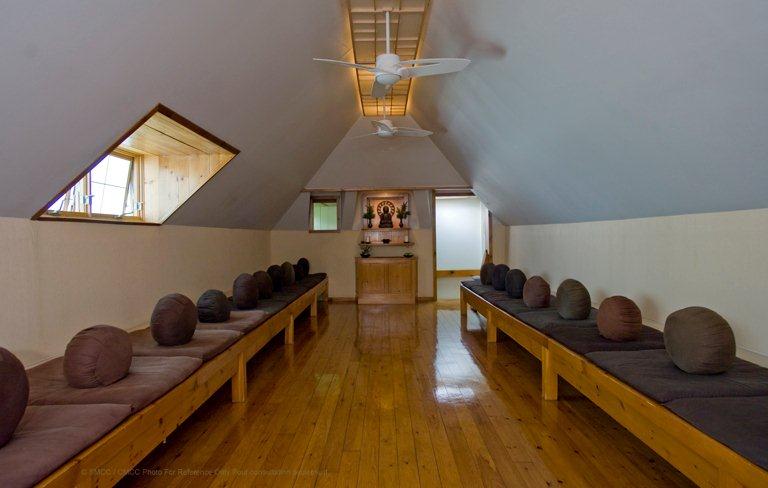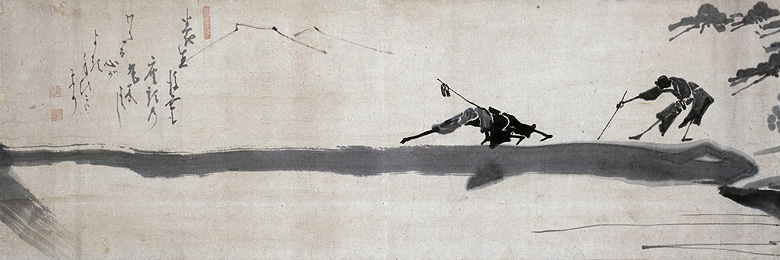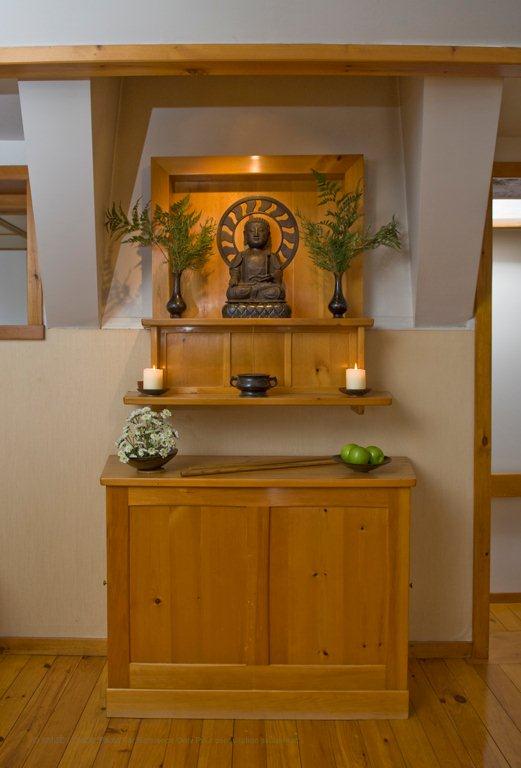Retreats
Intensive zazen retreats are the jewels of practice at the Montreal Zen Center. These retreats offer Center members an unparalleled opportunity to engage in an extended and sustained period of meditation in the company of others.
Each year, from October to May, four five-day retreats are held at the Center. They emphasize the need for patient and sincere effort required in Zen practice. They invite us to shed the life habits that keep us drowsy and to dive unreservedly into a sustained practice of attention and awakened vigilance, without respite, for several consecutive days.
The retreats are led in October and March by Jean-Luc Foisy and in December and May by Louis Bricault. Both have studied Zen for many years under Mr. Low.

Zazen, teishos and dharma words
Each period of zazen (sitting meditation) is of thirty minutes’ duration, followed by walking meditation, kinhin, for 7.5 minutes. One of the fundamental rules of zazen is physical immobility. In front of a wall, one is alone with oneself and, even as tensions gradually appear in search of some outlet, one does not move. The profound silence that arises from deep breathing is marked by the crack of the kyosaku: a step in the natural and intuitive practice of zen.

Each day, mid-morning, a recorded teisho is played or a dharma word is offered in French followed by questions or commentaries. During his years as director of the Centre, Albert Low recorded over one thousand teishos and we draw on this precious heritage to provide our practice with a strong and determining momentum. The more recent dharma talks were first offered on line during the COVID pandemic and they are now presented during our one-day sittings and the May and December retreats.
Listening to a teisho or a dharma talk is another form of zazen : sitting in formal zazen position, facing inwards, all participants listen with open hearts to these living words.
Words of encouragement, reminders and texts read by monitors at different times during retreats also contribute in maintaining an atmosphere of attention and vigilance conducive to a deepening of the practice.
By clicking on the link below, you will access the detailed retreat guidelines. Your presence at a retreat implies that you have read them and that you agree to respect them.
Retreats guidelines.pdf.jpg)
Daily schedule
The daily schedule, which is the same for a two-day, four-day or seven day-retreat is as follows:
- 5:30 - Wake-up bell
- 6:00 - Zazen
- 7:10 - Breakfast
- 7:30 - Work period
- 8:30 - Rest period
- 9:30 - Zazen
- 10:07 - Teisho
- 11:17 - Zazen
- 12:25 - Lunch
- 13:30 - Zazen
- 15:20 - Chanting
- 15:45 - Exercises
- 16:25 - Zazen
- 17:00 - Supper
- 17:20 - Rest period
- 19:00 - Zazen
- 20:45 - End of zazen
- 21:00 - Tea
- 23:00 - Night sitting (voluntary but highly recommended)
- 00:30 - End of night sitting
Everyone registering for a retreat commits to respect this schedule and to practice from moment to moment, throughout each activity. Silence is maintained from the first day to the last, and participants keep their eyes lowered in all circumstances.
Registration
For obvious reasons, retreats are reserved exclusively to members. (becoming member)
To register, you should forward your request by email at the following address: retraite.czdm@gmail.com at least two weeks prior to the date on which the retreat is scheduled to begin. By clicking on the link provided, you will access the required form.
Do not forget to indicate whether you have any physical disabilities that could prevent you from performing certain tasks or whether you wish to sit on a chair or “kneeling-chair”. You should very soon receive an acknowledgment of the receipt of your application. If not, please resend your request.
Two weeks prior to the retreat, you will receive a reply confirming that your application has been accepted or denied. If you have been accepted, we ask that you immediately confirm that you have received the acceptance. Your name will be placed formally on the registration list only after we have received your confirmation.
The fee for participating in a retreat is $65 per day, $32 for students.
The Chanting Ceremony
The Chanting Ceremony is an important aspect of the retreat. It lasts approximately twenty minutes and takes place every afternoon. Chanting also takes place before meals and at the end of the day's regular activities. During the afternoon ceremony, the Prajna Paramita Hridaya sutra, the Kanzeon sutra, the Return of Merits, and the Four Vows are chanted.
Although the time devoted to chanting during a retreat is relatively short, it nevertheless constitutes a vital aspect of the practice, particularly the Four Vows.
The chanting is accompanied by the continuous beating of the mokugyo, a rounded wooden drum, and by striking the keisu, a large, bowl-shaped gong. The gong originates in the hara (the body's energy center) and is performed with the hands in gassho (cupped hands salutation) in a monotone. During a retreat, singing is both an inspiration and a welcome relief that allows participants to unite their voices, creating a precious moment of expression and support.

The Three Refuges
(Standing, hands in gassho, facing altar)
- I take refuge in Buddha ...........(full prostration)
- I take refuge in Dharma...........(full prostration)
- I take refuge in Sandha............(Full prostration)
(Take a seat facing centre of zendo)
HEART OF PERFECT WISDOM
- The Bodhisattva of Compassion, from the depths of prajna wisdom,
- saw the emptiness of all five skandhas
- and sundered the bonds of suffering.
- Know then: Form here is only emptiness, emptiness only form
- Form is no other than emptiness,
- Emptiness no other than form.
- Feeling, thought and choice, consciousness itself, are the same as this.
- Dharmas here are empty, all are the primal void.
- None are born or die,
- Nor are they stained or pure, nor do they wax or wane.
- So in emptiness no form, no feeling, thought or choice,
- Nor is there consciousness.
- No eye, ear, nose, tongue, body, mind;
- no colour, sound, smell, taste, touch, or what the mind takes hold of,
- nor even act of sensing.
- No ignorance or end of it, nor all that comes of ignorance:
- no withering, no death, no end of them.
- Nor is there pain, or cause of pain, or cease in pain,
- or noble path to lead from pain.
- Not even wisdom to attain, attainment too is emptiness.
- So know that the Bodhisattva, holding to nothing whatever,
- But dwelling in prajna wisdom, is freed of delusive hindrance,
- rid of the fear bred by it, and reaches clearest nirvana.
- All buddhas of past and present, buddhas of future time,
- through faith in prajna wisdom come to full enlightenment.
- Know then the great dharani, the radiant peerless mantra,
- the supreme, unfailing mantra, the Prajna Paramita, whose words allay all pain.
- This is highest wisdom, true beyond all doubt, know and proclaim its truth:
- Gate, gate, paragate, parasamgate, bodhi, sva-ha!

KANZEON!
(lead chant introduces Kanzeon by chanting it once through and then giving the introducing "Kanzeon" - all come in on the "Praise....)
- Kanzeon!
- Praise to Buddha
- All are one with Buddha
- All awake to Buddha.
- Bouddha, Dharma, Sangha,
- Freedom, joy and purity.
- Through the day Kanzeon,
- Through the night Kanzeon,
- This thought comes from Buddha-mind,
- This thought is one with Buddha-mind.
Return of Merit
(lead chant introduces Return of Merit - hands in gassho)
- Ten Direction, Three Worlds,
- All Buddhas, Bodhisattva-mahasattvas
- Maha Prajna Paramita.
Four vows
(Kneel upright, facing altar, hands in gassho. Lead chant introduces The Four vows: "All beings without number")
- All beings, without number, I vow to liberate.
- Endless blind passions, I vow to uproot.
- Dharma gates, beyond measure, I vow to penetrate.
- The Great Way of Buddha, I vow to attain.
(Stand, facing altar, hands in gassho. Three prostrations.)
Hakuin Zenji’s Chant « In Praise of Zazen »
At the end of the formal activities 'Hakuin Zenji's Chant in Praise of Zazen' and the Four Vows are chanted.
Hakuin was a seventeenth-century Japanese Zen master. He was a deeply awakened man and his teaching helped to inspire a revival of interest in Zen practice in Japan.
- From the beginning all beings are Buddha.
- Like water and ice, without water no ice,
- outside us no Buddha.
- How near the truth yet how far we seek;
- like one in water crying ‘I thirst!’
- Like a child of rich birth wandering poor on this earth,
- we endlessly circle the six worlds.
- The cause of our sorrow is ego delusion.
- From dark path to dark path we wander in darkness.
- How can we be freed from the wheel of samsara?
- The gateway to freedom is zazen samadi.
- Beyond exultation, beyond all our praises, the pure Mahayana.
- Observing the precepts, repentance and giving,
- the countless good deeds, and the way of right living, all come from zazen.
- Thus one true samadhi extinguishes evils;
- It purifies karma, dissolving obstructions.
- Then where are the dark paths to lead us astray?
- The pure lotus land is not far away.
- Hearing this truth heart humble and grateful,
- to praise and embrace it, to practice its wisdom,
- brings unending blessings, brings mountains of merit.
- But if we turn inward and prove our True nature,
- that True Self is no self,
- our own Self is no-self,
- we go beyond the ego and past clever words.
- Then the gate to the oneness of cause and effect is
- thrown open.
- Not two and not three,
- straight ahead runs the Way.
- Our form now being no-form,
- in going and returning we never leave home.
- Our thought now being no-thought,
- our dancing and songs are the voice of the Dharma.
- How vast is the heaven of boundless samadhi!
- How bright and transparent the moonlight of wisdom!
- What is there outside us, what is there we lack?
- Nirvana is openly shown to our eyes.
- This earth where we stand is the pure lotus land,
- and this very body, the body of Buddha.
The Meal Chant
Before meals, the Meal Chant is chanted. This chant asks us to remember the toil of others and to be moderate in all things. All chants should be done mindfully and with vigor.
To invoke the compassionate nature is to awaken to the sufferings of others and to arouse the will to work for the salvation of all.
Food is symbolically offered to hungry and thirsty ghosts. This is a very ancient ritual, and in Zen it is interpreted to mean that an offering is made to appease those parts of ourselves which are too restless, so greedy for attention and thirsty for sensation, that they cannot join in with the practice but are always striving to pull away from it.
(leader)
- With all that lives, let us honor the Three Treasures,
- Let us recall the exertions of Buddhas and Bodhisattvas.
(All)
- This meal is the labor of countless beings,
- let us remember their toil.
- Gluttony stems from greed,
- let us be moderate.
- Our lives are sustained by this offering,
- let us be grateful.
- We take this food to attain the Buddha Way.
(food is served)
(All, with raised bowls or plates)
- Our meal is offered to Buddha, Dharma and Sangha.
- With teachers and family, with nations and all life
- let us equally share.
- To beings throughout the six worlds, we offer this meal.
(plates set down, offerings made hands in gassho)
- All hungry ghosts!
- All tortured spirits!
- Now we give you this Dharma-food.
- May it fill the ten directions
- and satisfy hunger in realms of darkness.
- All hungry ghosts!
- All tortured spirits!
- Abandon greed and rouse the desire for enlightenment.
- To you spirits tortured by thirst, we give this liquid offering.
- May your thirst be relieved,
- May your suff’ring diminish,
- May all beings attain Buddhahood!